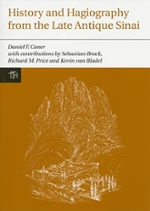History and Hagiography from the Late Antique Sinai
History and Hagiography from the Late Antique Sinai
- Daniel Caner, Sebastian Brock, Richard M. Price, Kevin van Bladel
- Publication Date
2010 - Website
- IUCAT
The texts assembled in this volume represent the interactions and outlook of monks, pilgrims, and beduins ('Saracens') on the Sinai Peninsula from the fourth to the seventh centuries CE. This is a part of the late Roman Province Paelestina Tertia (Third Palestine), the first region of the Roman Empire to be conquered by Arab invaders and it inspired the last great work of ancient romance, Pseudo-Nilus's Narrations. The latter is an example of how closely history was then wedded to fiction—or rather, hagiography and how new traditions were invented. When Christian hermits and pilgrims began to explore the Sinai peninsula, assigning a distinct history amd religious topography to its features, imaginary vestiges of Hebrew biblical experiences were detected on rock outcroppings, Nabatean graffiti was mistaken for Hebrew inscriptions. Indeed from the late fourth century onward, Christian imaginations transformed the Sinai's terrain into a kind of palimpsest, whre zealots of the New Dispensation might glimpse or settle over traces of the Old. This narrative and two others written c. 400-650, plus a collection of travel accounts, constitute the Sinai literature written by and for late antique Christians, which has long been used to reconstruct pilgrimage, monasticism, and Roman-Saracen relations in this area. In this book , detailed introductions and commentaries highlight unusual features and shared problems of each text. The historical essay and accompanying texts enable readers to explore the particular ideals and dangers associated with this remote political and religious frontier.
 The College of Arts
The College of Arts